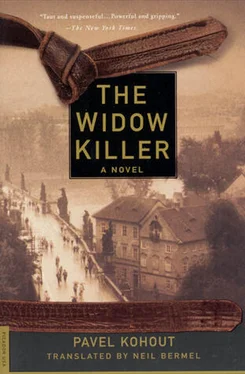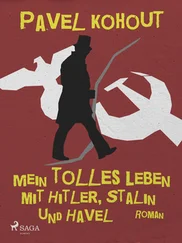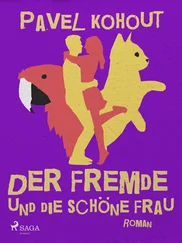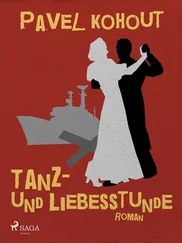“What else?”
“The straps he used to tie her up. Which means…?”
Morava the student knew.
“That he’ll do it again.”
“Exactly. I’m declaring an emergency.”
Erwin Buback put the dead woman out of his mind. It wasn’t his case. He probed for the contentment he had felt at noon and to his joy found it was still there. Not even the disgust he’d felt in the apartment — the worst ever in his career — could destroy this feeling. In his pragmatic way, he had broken the deed down into a series of colorless facts, just as the young Czech must have done.
He had been sitting alone for over an hour at the end of the bar in the German pub Am Graben; his evident lack of interest in human contact kept the other patrons at a distance. As he sipped a mediocre brandy of suspect origin — oh, where was sweet France? — he considered, for the first time since he lost Hilde and Heidi, what he would do after….
That unknown After. Would it bring sorrow or new hope? When would it finally come? What form would it take? And how should he prepare for it?
Was he exaggerating his skepticism? Or was he dangerously deformed by a profession that made him disbelieve everything he heard?
Why not give it a try? Admit, for a start, that the Führer could be preparing a gigantic trap, part of which was a false retreat on all fronts? If victory destroyed Europe’s existing social order and made way for a new era in history, what would it bring for Chief Inspector Erwin Buback?
If that fateful After came soon (it would have to, he thought, since they were running out of places to retreat to), it would find him just past forty, with a high-placed police job, an excellent salary — and alone.
On the day an unfamiliar voice, callused by years of these messages, had informed him briskly that the two reasons for his existence had perished, a large part of him died as well. The women who tried to comfort him hit a wall of ice. It was his awkward attempt to strike a bargain with Fate, as if his faithfulness would allow Hilde and Heidi to rise miraculously from the ashes.
Today’s noonday bomb had made him whole again. When the building shook, his long sleep ended, and he realized that over the past few months Hilde and Heidi had quietly become part of his living self. Interrupted contacts met again, like severed nerves. He began to feel once more.
If the Reich actually won the war — and if he himself did not die in it — he could not spend the rest of his life mourning them. The dead had to be replaced. Germany was paying a terrible price for victory (the lot of all great nations, he supposed) and would need new blood. If Hilde and Heidi had survived him, they would definitely have felt the same way. But which way was that?
The bar was filling up quickly, the noise grew louder. To stay meant risking the company of one of Meckerle’s thugs. They had the disturbing habit of drowning out their own fear with proclamations about the Final Victory; it would instantly make him doubt the very thing he was trying so hard to believe in. And starting tomorrow, he would be taking concrete steps to help bring it about.
He gave a wide berth to the deserted, reeking remains of the corner building and walked as slowly as he dared past HIS house, guided by the balustrade that ran along the sheer drop down to the towpath. In the black of night no one would recognize him, but still he only glanced quickly up at the top floor. The memory of his achievement filled him with contentment. Now he would eliminate the remaining threat to his continued success.
They were still working feverishly on the nearby bridge. Apparently a bomb had fallen there and tipped over a few statues. A crane lifted one of them off the tram tracks; it looked like a giant corpse. He halted and looked around. He was alone on the embankment.
He set his bag down on the sidewalk, opened it, and rummaged deep inside for IT. The wax-paper package was still soft; carefully he placed IT back in the corner of the bag, where IT would be better protected. Then he groped with his fingers for the handle of the knife sheathed beneath his shirt. As he placed it under his jacket he took care not to cut himself. That was how his failure in Brno had begun.
Across the street, a thin streak of light lined the bottom of the windowshade in the ground-floor window. He had it all thought out. He would ring the bell and say — if necessary— Luftschutzkontrole! Air-raid control! Better take off his hat and modify his voice, since he’d been stupid enough to speak to the man earlier. What else would he need? His foot, as a wedge; his elbow, as a crowbar; and, to be on the safe side, two quick blows. He had just stepped into the street when the sirens went off.
The freshly wounded city reacted quickly. Shadows hurried from the bridge down to the shelters. The last echo had barely faded into the distance when the sirens wailed yet again, their strange rising and falling glissandos prophesying an air raid.
THOSE FUCKING POLICEMEN!
A few yards farther and wide green steps led down to the towpath; he had planned to use it as his escape route afterward. Instead, he headed directly down toward the dark water. Nothing to be done; he’d come back later, once he’d changed his appearance. How much time left till the train? He had to put his watch up to his eyes to read the hands. Then he saw night become day.
The whine of planes high overhead and the distant bark of antiaircraft fire explained the light immediately. He knew the shining signal rockets on parachutes would dazzle the air defense systems, but instead of fleeing he stood mesmerized, watching the whirl of countless foil strips designed to distract the German gunners.
The fireworks had to be a thank-you message from HER!
The unearthly light show found Morava in Jitka’s company. “Take a motorcycle, drop Jitka off, and go home; I want you here bright and early tomorrow,” Beran had decided. The tram lines to Pankrác and Podolí were out of service and the superintendent had felt guilty keeping them late into the night under these conditions.
Morava turned cartwheels inside at this unexpected assignment; it turned a bloody day into a private celebration. Despite his good fortune, he would have seen her to the door of her suburban house (hidden in a romantic blind alleyway on a craggy wooded slope) and said good night with a courteous handshake — if not for the bombardiers. At that very moment, instead of dropping their bombs, they decided to rain a slowly descending radiance onto the city. Evidently they were trying to avoid another tragic error, but Jitka saw it as a warning of impending doom.
“Hurry,” she ordered with a firmness he had never seen in her before, “into the shelter!”
Of course, he did not protest, trembling as he obeyed the command. So they waited with last year’s potatoes, alone in a quite ordinary cellar. Half of it had been quickly cleared and redecorated with garden furniture; the landlords — a waiter and a cook — were working for a German military hospital in a former north Moravian health spa. When the all clear finally sounded, she invited him up to her attic room for tea with rum, since the kitchen downstairs was unheated.
Finally, he was warm enough to reclaim his courage.
“Please excuse me….” He had to clear his throat again before continuing. “Please excuse my rudeness in asking, but I’m not in the habit… do you think… that I could… that you could… that we might get to know each other better…?”
Meckerle was on the rag again; the entrance guards spread the word as usual after he had chewed them out. Immediately there were rumors as to why. Yesterday’s firestorm at Dresden had swallowed the villa the colonel “Aryanized” some years ago; it had been a symbol for him of his station. Of all the officers, only Buback was not quaking in fear.
Читать дальше












